

Is China seeking regime-change in North Korea? The announcement in Pyongyang on May 13 of the promotion of Jang Jong-nam to "minister of the People's Armed Forces" came out of the blue.
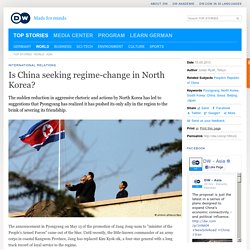
Until recently, the little-known commander of an army corps in coastal Kangwon Province, Jang has replaced Kim Kyok-sik, a four-star general with a long track record of loyal service to the regime. The reasons for 70-year-old Kim's replacement are not clear - as with most of the political maneuvers in North Korea - but it may have been his loyalty that cost him his position in the politburo. Kim was widely seen as a hawk in the regime and is believed to have been in command of the operation to shell the South Korean island of Yeonpyeongdo in November 2010, an incident that killed four people, destroyed civilians' homes and infrastructure and dramatically worsened the already strained relationship between Pyongyang and Seoul. And there are other indicators that Pyongyang is seeking to return to the status quo.
Missiles withdrawn. China-North Korea Dossier No. 2: “China’s ‘Measure of Reserve’ toward Succession” « SINO-NK. China-North Korea Dossier No. 2China’s “Measure of Reserve” toward Succession: Sino-North Korean Relations, 1983-1985Adam Cathcart and Charles Kraus Please click here to view the Dossier, “China’s ‘Measure of Reserve’ toward Succession.”
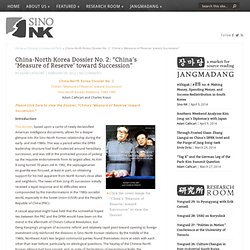
Introduction Click the cover image for “China’s ‘Measure of Reserve’ toward Succession” to view the Dossier This dossier, based upon a cache of newly declassified American intelligence documents, allows for a deeper glimpse into the Sino-North Korean relationship during the early- and mid-1980s. This was a period when the DPRK leadership structure had itself coalesced around hereditary succession, and was still in the protracted process of picking up the requisite endorsements from its largest allies. The documents examined here, and the assumptions which they are based upon, bear a great deal of resemblance to contemporary thinking about Sino-North Korean relations.
Beijing’s German Shepherd? Why China Will Not Abandon North Korea « SINO-NK. China’s support of new UN sanctions on North Korea would appear to strengthen the idea that Beijing is finally moving toward an “abandonment” of its traditional alliance with Pyongyang.
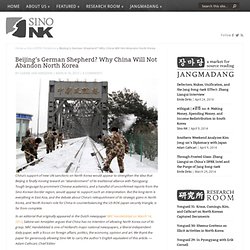
Tough language by prominent Chinese academics, and a handful of unconfirmed reports from the Sino-Korean border region, would appear to support such an interpretation. China Warns US Over Missile Defence Program Against North Korea. China has said that US plans to bolster missile defences in response to provocations by North Korea would only intensify antagonism, and urged Washington to act prudently.
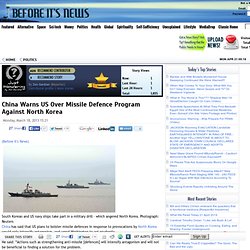
A Chinese foreign ministry spokesman, Hong Lei, made the comments at a daily news briefing. He said: “Actions such as strengthening anti-missile [defences] will intensify antagonism and will not be beneficial to finding a solution for the problem. “China hopes the relevant country will proceed on the basis of peace and stability, adopt a responsible attitude and act prudently.” Www.ncnk.org/resources/publications/China-Koreas-Unification-Lugar-Dec-2012.pdf. Would China Block Korean Unification?
With some arguing China is turning North Korea into a 21st-century tributary state, it can’t stop its reunification with the South.
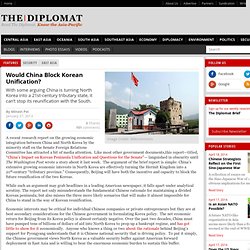
A recent research report on the growing economic integration between China and North Korea by the minority staff on the Senate Foreign Relations Committee has attracted a bit of media attention. Like most other government documents,this report—titled, “China’s Impact on Korean Peninsula Unification and Questions for the Senate”— languished in obscurity until The Washington Post wrote a story about it last week.
The argument of the brief report is simple: China’s extensive growing economic interests in North Korea are effectively turning the Hermit Kingdom into a 21st-century “tributary province.” Consequently, Beijing will have both the incentive and capacity to block the future reunification of the two Koreas. While such an argument may grab headlines in a leading American newspaper, it falls apart under analytical scrutiny. China's delicate balancing act with North Korea.
13 February 2013Last updated at 08:50 ET By Celia Hatton BBC News, Beijing Trade between China and North Korea is rising, but it is unbalanced North Korea's nuclear test came at an inconvenient time for Chinese diplomats.
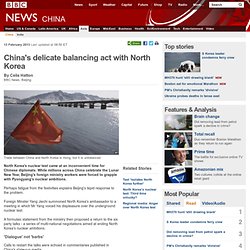
While millions across China celebrate the Lunar New Year, Beijing's foreign ministry workers were forced to grapple with Pyongyang's nuclear ambitions. Perhaps fatigue from the festivities explains Beijing's tepid response to the problem. Beijing’s North Korea Problem. North Korea Tests the Patience of Its Ally, China. Ng Han Guan/Associated Press North Korean workers in a field outside Pyongyang, the capital.
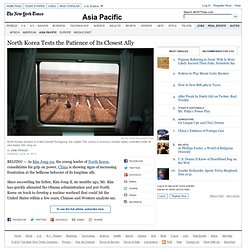
The country's economy remains tightly controlled under its new leader, Kim Jong-un. Since succeeding his father, Kim Jong-il, six months ago, Mr. Kim has quickly alienated the Obama administration and put North Korea on track to develop a nuclear warhead that could hit the United States within a few years, Chinese and Western analysts say. Most surprising, though, is how Mr. Now, the Obama administration and the Chinese government, who warily consult each other on North Korea, are waiting to see if Mr. This month, the North Korean news agency said there were no plans for a third test “at present,” a statement analysts said suggested Mr. “We have made this absolutely clear to them; we are against any provocation,” Cui Tiankai, another Chinese vice minister of foreign affairs, said in a recent interview when asked about a possible third nuclear test by North Korea.
Mr. Chinese military conducts river-crossing drill. DANDONG, China (Yonhap) -- More than 100 Chinese soldiers took part in a river-crossing exercise on its Yalu River border with North Korea Tuesday, renewing speculation the Chinese military is preparing to defend against any influx of North Korean refugees following possible regime collapse in Pyongyang.
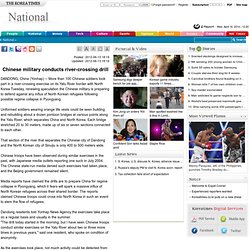
Uniformed soldiers wearing orange life vests could be seen building and rebuilding about a dozen pontoon bridges at various points along the Yalu River, which separates China and North Korea. Each bridge stretched 20 to 30 meters, made up of six or seven sections connected to each other. That section of the river that separates the Chinese city of Dandong and the North Korean city of Sinuiju is only 400 to 500 meters wide. Chinese troops have been observed during similar exercises in the past, with Japanese media outlets reporting one such in July 2004. The Chinese state-run media denied such exercises had taken place, and the Beijing government remained silent. Rogue Company or Nation?
Speculation continues over what China knew about possible missile launchers sold to North Korea.
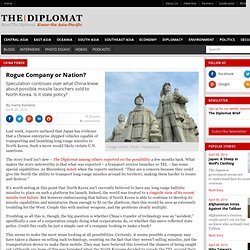
Is it state policy? By Harry Kazianis for The Diplomat June 20, 2012 Facebook0 Twitter0 Google+1 LinkedIn0 Last week, reports surfaced that Japan has evidence that a Chinese enterprise shipped vehicles capable of transporting and launching long-range missiles to North Korea. China Carries Out Artillery Drills Near N.Korean Border. China recently moved an Army corps close to the North Korean border and staged a live-fire exercise with tanks and self-propelled guns.
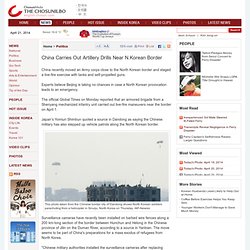
Experts believe Beijing is taking no chances in case a North Korean provocation leads to an emergency. The official Global Times on Monday reported that an armored brigade from a Shenyang mechanized infantry unit carried out live-fire maneuvers near the border on April 1. Japan's Yomiuri Shimbun quoted a source in Dandong as saying the Chinese military has also stepped up vehicle patrols along the North Korean border.
North Korea’s Growing Trade Dependency on China: Mixed Strategic Implications. North Korean workers nap on piles of fertilizer shipped from China on the banks of Yalu River near the North Korean town of Sinuiju (Jacky Chen/courtesy Reuters) North Korea’s trade dependency on China has skyrocketed in the past year, reaching US$5.63 billion in 2011, an increase of 62.5 percent from $3.46 billion in 2010. Meanwhile, trade with South Korea, which is North Korea’s second largest trading partner, dropped by ten percent in 2011 to $1.71 billion. As a result, North Korea’s trade dependency on China appears to have risen dramatically.
Korea Trade-Investment Promotion Agency(KOTRA) figures suggest an increase from 42 percent in 2008 to over 70 percent in 2011. Figure 1. The real power behind North Korea. Editor's Note: Neil K. Shenai is doctoral candidate in International Political Economy at Johns Hopkins University SAIS, writing his dissertation on the global financial crisis. Visit his blog here and follow him on Twitter. Kevin Kim is a Research Fellow at the U.S. -Korea Institute at SAIS, where he is an Editor of the SAIS Review. By Neil K. In the weeks following Kim Jong-il’s death, many North Korea observers questioned whether his third son and chosen heir, Kim Jong-un, could successfully consolidate power in the wake of his father’s death. While this exercise is potentially fruitful, trying to speculate about the domestic politics of North Korea remains guesswork – the DPRK is notoriously opaque, leaving analysts little room for forming reliable projections.
According to the Chinese perspective, support for the Kim dynasty helps China achieve both security and continued prosperity for its people. The views expressed in this article are solely those of Neil K.